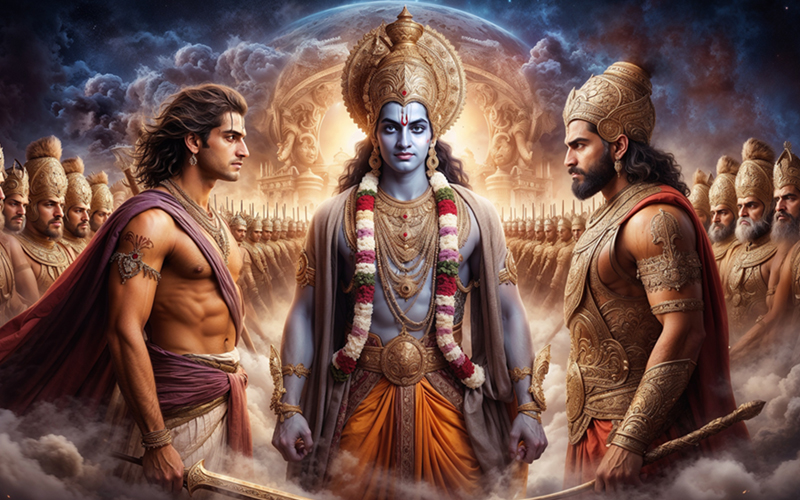Physical Address
Empirical System, 105 First Floor Pitru Krupa, Opp. R.K. Desai College, Koparli Road, Vapi (Gujarat) 396 191
Physical Address
Empirical System, 105 First Floor Pitru Krupa, Opp. R.K. Desai College, Koparli Road, Vapi (Gujarat) 396 191

Before the Kurukshetra War in the Mahabharata, both Arjuna and Duryodhana sought the support of Lord Krishna. This event is a significant moment, highlighting the different characters and choices of the two leaders.
The Meeting with Lord Krishna
As the conflict between the Pandavas and Kauravas seemed inevitable, both sides began to seek allies. Knowing Lord Krishna’s immense power and influence, both Arjuna and Duryodhana went to seek his assistance. They arrived in Dwaraka, Lord Krishna’s kingdom, on the same day, but their approaches were markedly different.
Duryodhana arrived at Lord Krishna’s palace first. Upon reaching, he found Krishna asleep. Not wanting to lose the opportunity and eager to secure Lord Krishna’s support, Duryodhana took a seat at Krishna’s head. This act was not merely a matter of convenience but a calculated move to assert his superiority and ensure he would be seen as the primary seeker of Krishna’s favor. He believed that sitting at Krishna’s head would signal his importance and priority.
Arjuna arrived shortly after Duryodhana. Observing that Krishna was still asleep, Arjuna chose to wait respectfully at Krishna’s feet. He did not presume to take any liberties with Krishna, understanding that reverence and respect were paramount in seeking divine assistance. Arjuna’s demeanor was one of humility and devotion, contrasting sharply with Duryodhana’s approach.
When Krishna awoke, he first saw Arjuna, as he was standing at his feet. He then noticed Duryodhana sitting by his head. Krishna, with his divine insight, immediately understood the motives and intentions of both princes. He greeted them warmly and inquired about their purpose for the visit. Duryodhana stated that he had come to seek Krishna’s support in the upcoming war, specifically requesting Krishna’s help as an ally.
Duryodhana was quick to speak, reminding Krishna that he had arrived first and thus had the right to choose first. Krishna, however, explained that he had seen Arjuna first and, according to the customs of divine respect, would address him before Duryodhana. Despite this, Krishna assured them that he held both of them dear. To resolve the situation, Krishna proposed a choice: one could choose him, who would be unarmed and would not participate directly in the war, while the other could choose his mighty Narayani Sena, his vast and formidable army. Since Krishna saw Arjuna first, he was offered the choice first. Arjuna expressed that he had come to seek Krishna’s guidance and assistance, but more importantly, he sought Krishna’s presence, believing that Krishna’s support and counsel were crucial for him in the battle.
Duryodhana, eager for military strength, quickly chose the Narayani Sena. He believed that the vast army would give him a significant advantage in the war. He was confident that military might was the key to victory.
Arjuna, with devotion and faith in Krishna, chose Krishna himself, even though Krishna had vowed not to take up arms in the battle. For Arjuna, Krishna’s guidance, wisdom, and moral support were more valuable than an entire army. Arjuna’s choice reflected his belief in the supreme value of divine counsel over mere physical power.
Thus, Duryodhana left with the army, confident in his choice, while Arjuna, with Krishna as his charioteer, left with a heart full of gratitude and faith. This incident highlights the differing values and perspectives of Duryodhana and Arjuna—Duryodhana’s reliance on physical strength and numbers, and Arjuna’s trust in divine guidance and wisdom.
Moral of the Story
This incident teaches us an important lesson about the value of choices and where we place our trust. Duryodhana’s choice reflects a mindset that values material strength and numbers, showing his reliance on sheer power to achieve his goals. In contrast, Arjuna’s decision to choose Krishna, despite Krishna’s vow not to fight, illustrates the importance of wisdom, guidance, and spiritual support. Arjuna’s faith in Krishna’s presence and counsel was more valuable than an entire army, showing that divine guidance and righteousness often outweigh brute force.
As we reflect on this story, we are left with an intriguing question: Why did Lord Krishna vow not to take up arms in the battle? Comment down your answers below and don’t forget to like, share, and subscribe to our channel, “The Vibes of Divinity.” Thanks for watching!